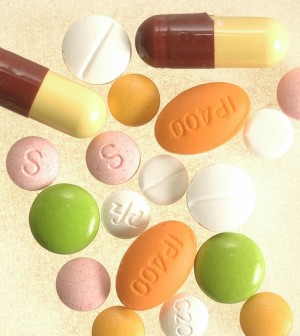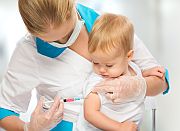- Could Artificial Sweeteners Be Aging the Brain Faster?
- Techniques for Soothing Your Nervous System
- Does the Water in Your House Smell Funny? Here’s Why
- Can a Daily Dose of Apple Cider Vinegar Actually Aid Weight Loss?
- 6 Health Beverages That Can Actually Spike Your Blood Sugar
- Treatment Options for Social Anxiety Disorder
- Understanding the Connection Between Anxiety and Depression
- How Daily Prunes Can Influence Cholesterol and Inflammation
- When to Take B12 for Better Absorption and Energy
- Epsom Salts: Health Benefits and Uses
Inhaled Measles Vaccine Falls Short of Injected Version in Study


A comparison of injected and inhaled measles vaccines in Indian infants found the injected version provoked a much stronger immune system response, researchers report.
International scientists split a group of 2,000 babies between the ages of 9 and 12 months into two equal groups, giving them a single dose of either injected or inhaled measles vaccine. While none of the children contracted measles, blood tests showed significantly more antibodies against the virus in children injected with the vaccine.
Vaccine experts said the trial, funded by the Bill and Melinda Gates Foundation, showed that the injected measles vaccine — the prevailing version in the United States — should remain the gold standard. The vaccine typically is administered in combination with other vaccines for mumps, rubella and varicella (chickenpox), known as the MMR or MMRV vaccines.
“This was a study of the delivery mechanism more than the vaccine, and I think it says that giving it by shot is better than the inhaled version,” said Dr. Kenneth Bromberg, director of the Vaccine Research Center at The Brooklyn Hospital Center in New York City.
“Whatever advantages there were to the inhaled vaccine are negated by the [children’s] immune response to the injected version,” added Bromberg, who wasn’t involved in the research.
The study is published in the April 16 issue of the New England Journal of Medicine.
The United States is in the midst of a multistate measles outbreak linked to an amusement park in California. According to the U.S. Centers for Disease Control and Prevention, 159 people have had measles in 2015 as of April 10. In 2014, there were a record 668 cases reported in 27 states.
This represents the largest number of measles cases since the condition had previously been eliminated in the United States in 2000. Highly contagious, the virus typically results in a body rash and can be dangerous or even fatal to certain people.
But the anti-vaccine movement among some parents, which has led to recent outbreaks, wouldn’t be addressed by changing from shots to inhaled versions of the measles vaccine, experts said.
“The measles outbreak we’re currently experiencing is from lack of adequate use of the vaccine, but I think that’s because of vaccine phobia,” said Dr. Lorry Rubin, chief of pediatric infectious diseases at Cohen Children’s Medical Center of New York in New Hyde Park, N.Y. He wasn’t involved in the new study.
Anyway, Rubin added, the American system of delivering multiple vaccines in one shot couldn’t be replaced by a single-dose of inhaled measles vaccine, even if a needle-free version were more desirable.
“Of course, we have a motivation to keep injections to a minimum, and by getting three [or four] vaccines all in one syringe, we’re doing that,” he said.
Led by physicians at the World Health Organization, the new study tracked the babies receiving inhaled or injected measles vaccines for about three months post-immunization. Blood tests showed antibodies for measles in about 85 percent in the inhaled vaccine group, compared with nearly 95 percent of the injected vaccine group.
Neither group suffered serious health complications stemming from the immunizations.
“The aerosolized [inhaled] vaccine was still quite an effective vaccine — compared to getting nothing, this [result] was terrific,” Rubin said. “But the injected vaccine seems to work better, at least for the infant-toddler dose, clearly.”
More information
The U.S. Department of Health and Human Services offers more specifics on the measles vaccine.
Source: HealthDay
Copyright © 2026 HealthDay. All rights reserved.










